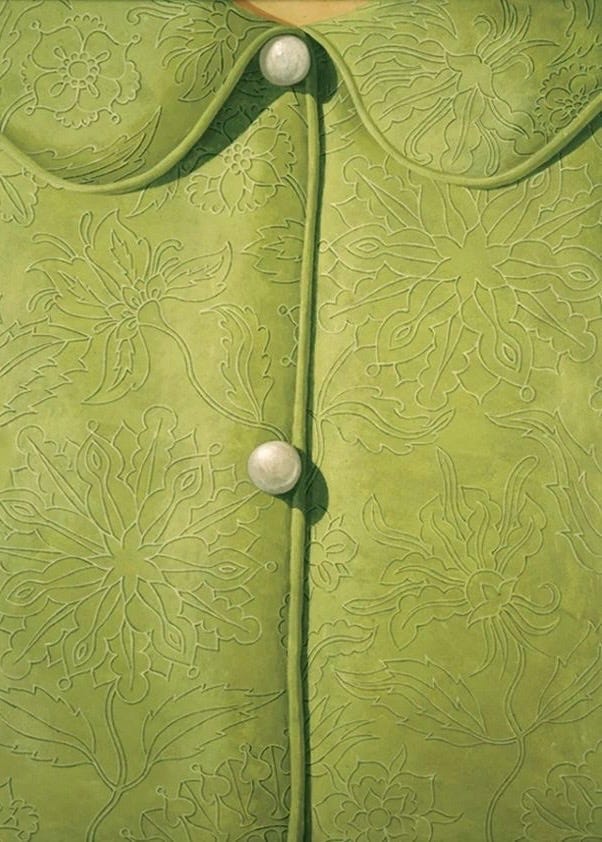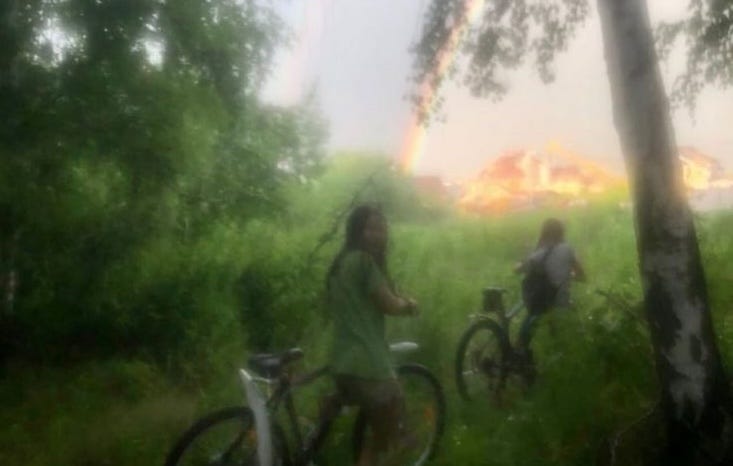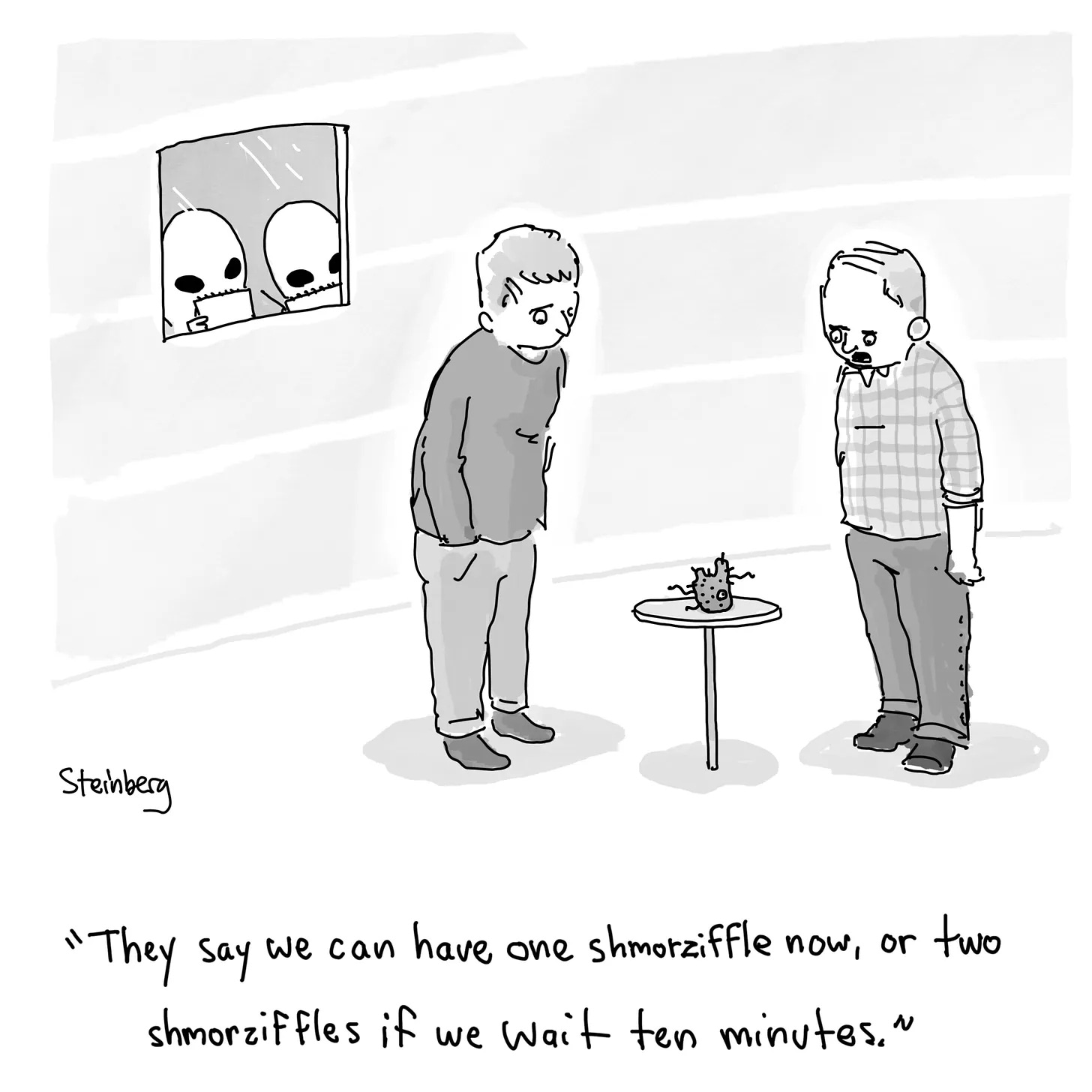“This planet of squirrels and romance and basketball and moonlight”
In this edition of the Weekender: liars in love, warped time perception, cartoon tables, and the search for an apartment

This week, we’re kissing liars, slowing time, drawing tables, and apartment hunting.
ESSAY
Say yes
A sharp and beautifully structured piece about memory, desire, and saying yes.
Yes three ways
—
inJim was a liar, as am I. He liked wrapping things: books, a fountain pen, my ankle once when it was burned. He said, “In dreams, you’re all the characters, aren’t you?” I was in bed beside him. A strand of hair was caught in my mouth. I said, “Is this your way of saying you dreamt about me?” He said, “I dreamt about a small horse.” I said, “Close enough.”
I thought about him all the time. It was great. I knew it wouldn’t last. Believe me, I knew. I knew it wouldn’t last past when the skin on my ankle looked normal again. Did I really know? Yes. What does it mean to override what you know? It means you get to have a life.
We drank tequila and ate hard boiled eggs with salt and hunks of bread. It wasn’t me. I went with it. Such is love. I tore apart a lettuce and saw Jim’s face inside. I looked at nerve cells under a microscope, and there was his smile. A friend who wasn’t that nice told me he had a stupid smile, the expression of a car mechanic finding the problem with a carburetor. I could see what she meant. Then I blinked.
I kissed his fingertips and the tiny hairs along the innocent-looking back of his neck. On the corner where he lived, the bagel shop smelled of poppy seeds. Trees smelled of jasmine. I liked to pass the noodle place, where cabbies hung out, because in five minutes I would be at his door. That summer, I walked until the sky turned white. I did this as often as I could. I was changed by knowing him. It’s easier to see this looking back. I don’t know how I was changed. It may have been in the bar with the mariachi music and plastic chairs. It may have been saying less.
When I say that Jim and I were both liars, do I mean we were social animals, trying to get along with other people, or do I mean we were unknown to ourselves? When I say, “I don’t care,” I’m looking for a sign. Human embryos are female until certain chemicals shoot in like gas in a ventilating system. Some male fish can transform themselves into females in order to reproduce. Have you ever thought you were a visitor in the place where you lived? It’s refreshing and alienating only briefly. There are spaces that lack rooms and walls and therefore don’t exist in architecture. For example, the word yes.
PHOTOGRAPHY

PERCEPTION
How long was this week, really?
A neuroscience-based breakdown of why time seems to fly, and what our brains are doing while it does.
how to slow down time (the neuroscience of time perception)
—
inMany of us sense that time is moving faster than it used to. Entire months disappear in the space of a week. June rolls around before we’ve finished processing March?! (And now that I’m editing this, it’s already July…)
It’s not just a feeling, and it’s not aging, exactly. It’s perception. And perception is constructed.
Time doesn’t speed up. But the way the brain encodes experience does change over time. And that changes how long time feels.
Unlike sight or hearing, there’s no sensory organ for time. No clock in the brain. Time perception is distributed, flexible, and deeply context-dependent. It’s built through a combination of neural systems tracking motion, attention, memory, and internal body rhythms.
Our brains track time on at least three different scales, each managed by different brain regions:
Milliseconds to seconds. This is the brain’s short-range stopwatch. The cerebellum and sensory cortices manage fast, precise timing needed for things like speech, music, and quick movements (basically, anything that requires split-second coordination).
Seconds to minutes. This is the middle range, where we hold onto time just long enough to plan and act. The prefrontal cortex and basal ganglia help us stay focused, estimate short durations, and make quick decisions.
Longer durations. This is the brain’s personal timeline. The hippocampus and precuneus help you store and recall events that stretch across hours, days, or years. These regions shape your sense of continuity (your life story) and allow you to remember, reflect, and imagine the future.
Each time scale isn’t just measured, it’s experienced, and that experience is shaped by what the brain is doing while it ticks.
PAINTING

IN MEMORIAM
Remembering Andrea Gibson
A moving farewell to Andrea Gibson, whose poetry and newsletter found light in the most difficult situations.
Andrea Gibson 8/13/75 – 7/14/25
—
inA couple years ago, Andrea said, “Whenever I leave this world, whether it’s sixty years from now, I wouldn’t want anyone to say I lost some battle. I’ll be a winner that day.”
Whatever beast of emotion bucks or whimpers through you right now, I hope you can hold that line beside it: Andrea didn’t lose anything. If you had been here in our home during the three days of their dying—if you’d seen dozens of friends drift in to help, to say goodbye, to say thank you, to kiss their perfect face, if you’d felt the love that floored every hospice nurse—you would have agreed. Andrea won.
I won’t sugarcoat the fact that they desperately wanted more time on this planet that they loved so much. This planet of squirrels and romance and basketball and moonlight.
But the time they had was significant, prismatic, and wild. It was full of trampolines and mountain ranges, stage lights and pants-peeing laughter. In their words, they “juiced the sun for every holy drop.” One of the last things they said before dying was, “I fucking loved my life.” Their conviction stunned the room.
If Andrea’s life was a poem (and it was), could there be a better last line?
If you're new here, a little backstory: In 2021, before the diagnosis, Andrea announced they were writing a newsletter, titled Things That Don’t Suck. A few weeks later, we learned they had ovarian cancer.
At first, Andrea said, “What a terrible time to be committed to writing about what doesn’t suck.” Then, almost immediately, they shifted their perspective and said, “What a perfect time.”
And so, this space was born. Part journal, part poetry, part pep talk, part treasure hunt. It became an archive of Andrea’s ability to find beauty in unlikely places, to wring gratitude from even the hardest hours. A museum of how they danced through their diagnosis, always turning their compass toward joy. It fostered a community they deeply loved.
And Andrea wanted all of it to continue.
POETRY

ANIMATION
LITERATURE
Real estate
Caleb Caudell captures a chaotic glimpse at modernity in the context of moving.
My heritage I’m flippantly flushing. . .
—
in Middle American LiteratureMy girlfriend and I looked at an apartment one street east of our current place, in the same enchanting neighborhood of majestic oaks and ornate fountains and geriatric mushroom people and inscrutably isolated and affluent individuals living in three and four story homes by themselves, crocheting and sharpening knives in the turret windows, in the same densely foliated grid that hosts parades and flea markets and fish frys, with the requisite two or three colossal government assisted shanties housing 60 tenants who deposit engineless 1989 dodge chargers and two door pontiac sunfires on the streets and in the alleys behind their homes.
This apartment was a hand carved dream, a darkly gleaming jewel of prewar craftsmanship, probably loaded with asbestos and other discontinued materials that destroy brain and sperm cells, but the build, the old wood trim, the wide hallways where you could ballroom dance down to the kitchen, the two true bedrooms and a dining room with built in bookcases, the claw foot tub, the front porch hidden by hedges, the backyard garden, the diffuse atmosphere of elegance, all would make the inevitable ingestion of paint chips and fiberglass worth it.
Of course, moving from one apartment to another in the same city in the same neighborhood solves none of our problems, such as the continuing devaluation of the dollar, the accelerated splintering of our immediate families and decrepitude of our parents, the increasing distaste for available lines of work and the all-purpose spreading of a spiritual, cultural and social wasteland within and without, the plastic, unreal yet undeniable Helmann’s Malaise flooding the decivilizing world.
And the apartment isn’t available anyway, as we learned toward the end of the tour that pets aren’t allowed, and we have three cats, our late millennial replacement for children as everyone knows and bemoans; the birth rate is tanking because we selfishly decided to become Disney adults and devote our lives to riding the tower of terror and taking pictures of ourselves with mouths agape while holding Cambodian corn dogs with spicy red sauce and playing obscenity laden board games with our cats whom we dress up as our favorite marvel superheroes and harry potter characters, and children wouldn’t work with our budget and lifestyle, sorry human race, sorry great grandparents I never knew but whose grim struggles and knife fights and dirt sandwiches were endured solely for the sake of continuing the family legacy, them thinking golddamnit I’m only scalping injuns and sucking down squirrel head soup and burning the great plains to a crisp so that my descendants will one day be fruitful and multiply and carry this genetic line forward; my heritage I’m flippantly flushing down a backed up toilet as I browse subscription single origin coffee services and listen to three podcasts at once—a lifestyle that includes sleeping in until 2 pm on weekends, sleeping in hyperbaric hydroponic marijuana steam pods and watching lewd atheist cartoons and eating psychedelic cereal, letting Mayan demon pimps trick me out on astral streetcorners, and if we had a kid or two who might be the latest son of Satan, or a Stephen King style firestarter, a force of elemental or devilish chaos, or a supercharged genetically modified cornfed autist, the real heavy kind, not the slightly cerebral bore with peculiar obsessions but the headbutting holes in the wall Kodiak bear sized nonverbal nightmare child of God, a miracle and a gift, I mean—that would be fine, but cats, pets, absolutely not, out of the question.
COMICS
At the table
An ode to the flexibility of tables.
Table Settings
—
inCartoons often have settings. Desert islands, for example, or the doctor’s office. These specific frameworks provide the context for the joke, and you go from there.
Other times, the setting can be incidental. A couple walking down the street having a conversation. People have to talk somewhere.
Me? I love the table. They say draw what you know, and I know all about sitting at tables. Round tables. Rectangle tables. All sorts of tables. Tables might seem boring, but they are the perfect blank slate. Anything can happen at a table. Don’t believe me? Just take a look.
STAR-CROSSED
Substackers featured in this edition
Art & Photography:
, , , ,Video & Audio:
Writing:
, , , ,Recently launched
Inspired by the writers and creators featured in the Weekender? Starting your own Substack is just a few clicks away:
The Weekender is a weekly roundup of writing, ideas, art, audio, and video from the world of Substack. Posts are recommended by staff and readers, and curated and edited by Alex Posey out of Substack’s headquarters in San Francisco.
Got a Substack post to recommend? Tell us about it in the comments.




























I’m delighted to be included in Substack Reads! What an honor. 🥰
The Substack Post. Full of every topic known to humankind…
EXCEPT POTTERY!!!!!
😛